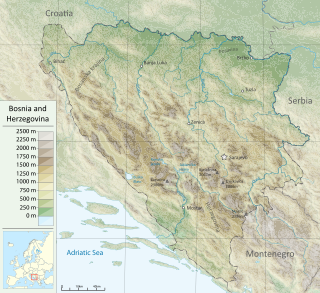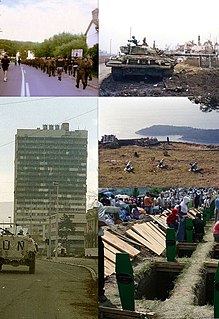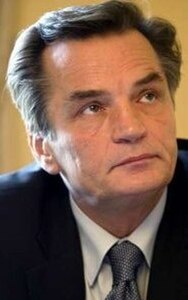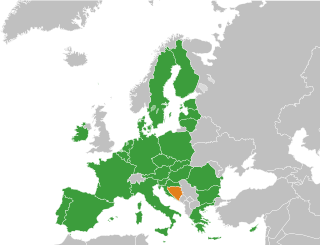See also
Bosnia and Herzegovina topics | ||
|---|---|---|
| History | ||
| Geography | ||
| Governance | ||
| Economy | ||
| Society | ||
| Culture | ||
Years in Europe | |
|---|---|
| Sovereign states |
|
| States with limited recognition | |
| Dependencies and other entities | |
| Other entities | |
This is a list of years in Bosnia and Herzegovina . For only articles about years in the country that have been written, see Category:Years in Bosnia and Herzegovina.

Bosnia and Herzegovina, abbreviated BiH or B&H, sometimes called Bosnia–Herzegovina and often known informally as Bosnia, is a country in South and Southeast Europe, located within the Balkans. Sarajevo is the capital and largest city.

Bosnia and Herzegovina is located in Southeastern Europe, in the western Balkans. It has a 932 km (579 mi) border with Croatia to the north and southwest, a 357 km (222 mi) border with Serbia to the east, and a 249 km (155 mi) border with Montenegro to the southeast. It borders the Adriatic Sea along its 20 km (12.42 mi) coastline.

The economy of Bosnia and Herzegovina is a transitional economy with limited market reforms. Bosnia and Herzegovina declared independence from socialist Yugoslavia on 1 March 1992.

Alija Izetbegović was a Bosnian politician, lawyer, Islamic philosopher and author, who in 1992 became the first president of the Presidency of the newly independent Republic of Bosnia and Herzegovina. He served in this role until 1996, when he became a member of the Presidency of Bosnia and Herzegovina, serving until 2000.

Republika Srpska is one of the two entities of Bosnia and Herzegovina, the other being the Federation of Bosnia and Herzegovina. Its largest city and administrative centre is Banja Luka, lying on the Vrbas river.

The Federation of Bosnia and Herzegovina is one of the two entities that compose the State of Bosnia and Herzegovina, the other being Republika Srpska. The Federation of Bosnia and Herzegovina consists of 10 autonomous cantons with their own governments and legislatures.

The Yugoslav Wars were a series of separate but related ethnic conflicts, wars of independence, and insurgencies fought in the former Yugoslavia from 1991 to 2001, which led to the breakup of the Yugoslav federation in 1992. Its constituent republics declared independence, despite unresolved tensions between ethnic minorities in the new countries, fueling the wars.

The Football Association of Bosnia and Herzegovina, based in Sarajevo, is the chief officiating body of football in Bosnia and Herzegovina. The Bosnian football association was founded as the Sarajevo football sub-association of Yugoslavia in 1920. In 1992 the association was re-founded as the football association of Bosnia and Herzegovina.

The M:tel Premier League of Bosnia and Herzegovina, also known as Liga 12, is the top tier football league in Bosnia and Herzegovina, and is operated by the Football Association of Bosnia and Herzegovina. As the country's most prestigious level of football competition, the league changed format in the 2016–17 season and is contested by 12 clubs with the last two teams relegated at the end of every season.

Bosnia and Herzegovina has participated in the Eurovision Song Contest 19 times since making its debut in 1993, after coming second in the qualification round "Kvalifikacija za Millstreet". Prior to 1993, Bosnia and Herzegovina participated in the Eurovision Song Contest as part of Yugoslavia.

Hrvatski košarkaški klub Široki, commonly referred to as HKK Široki or simply Široki, is a men's professional basketball club based in Široki Brijeg, Bosnia and Herzegovina. The team currently competes in the Basketball Championship of Bosnia and Herzegovina. With ten Bosnia and Herzegovina Championship and nine Cups of Bosnia and Herzegovina won Široki is the most successful basketball team in the country.

Banja Luka International Airport, also known as Mahovljani Airport, after the nearby village of the same name, is an airport located 18 km (11 mi) north northeast of the railway station in the city of Banja Luka, the largest city in Republika Srpska, and second largest in Bosnia and Herzegovina. The airport is managed by the government-owned company "Aerodromi Republike Srpske".

Haris Silajdžić is a Bosnian politician and academic who served as the 5th Bosniak Member of the Presidency of Bosnia and Herzegovina from 6 November 2006 until 10 November 2010 and as the 3rd Prime Minister of the Republic of Bosnia and Herzegovina from 25 October 1993 to 30 January 1996.

Željko Komšić is a Bosnian politician and diplomat who is the 6th and current Croat member of the Presidency of Bosnia and Herzegovina. He served as the Presidency member already from 2006 until 2014, and he was elected to the same office for a third term in the 2018 election, thus becoming the second Presidency member overall and the first, and so far only Croat member to serve more than two terms. He was sworn in on 20 November 2018, along with fellow newly elected presidency members Šefik Džaferović (Bosniak) and Milorad Dodik (Serb).

The accession of Bosnia and Herzegovina to the European Union is the stated aim of the present relations between the two entities. Bosnia and Herzegovina has been recognised by the EU as a "potential candidate country" for accession since the decision of the European Council in Thessaloniki in 2003 and is on the current agenda for future enlargement of the EU. Bosnia and Herzegovina takes part in the Stabilisation and Association Process and trade relations are regulated by an Interim Agreement.

The Constitutional Court of Bosnia and Herzegovina is the interpreter and guardian of the Constitution of Bosnia and Herzegovina, It has the appellate jurisdiction over issues arising out of a judgment of any other court in the country, including the constitutional courts of the two entities and the Court of Bosnia and Herzegovina.

Bisera Turković is a Bosnian diplomat and politician who is the current Minister of Foreign Affairs. She is also the current Vice-Chairwoman of the Council of Ministers of Bosnia and Herzegovina, serving alongside Vjekoslav Bevanda. Turković is the first female foreign minister of Bosnia and Herzegovina.
Bosnia and Herzegovina Women's Premier League is the top level women's football league of Bosnia and Herzegovina. Since 2013 the league has been unified. Before it was played in two separate groups based on league systems confined within Bosnia's entities, one being the First Women's League of the Federation of Bosnia and Herzegovina and the other First Women's League of the Republika Sprska, with the champion being decided through play-offs.
An independence referendum was held in Bosnia and Herzegovina between 29 February and 1 March 1992, following the first free elections of 1990 and the rise of ethnic tensions that eventually led to the breakup of Yugoslavia. Independence was strongly favored by Bosniak and Bosnian Croat voters while Bosnian Serbs boycotted the referendum or were prevented from participating by Bosnian Serb authorities.